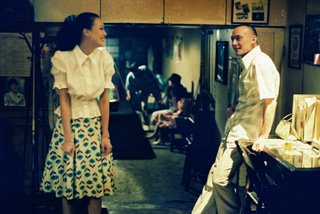Film Three Times (Zui hao de shi guang; Hsiao-hsien Hou, 2005)
 Tonight, with a friend (while my wife practiced - she's on stage tomorrow!), I saw the critically acclaimed Taiwanese film Three Times at our historic Carolina Theatre. The description that the theatre's site had posted is:
Tonight, with a friend (while my wife practiced - she's on stage tomorrow!), I saw the critically acclaimed Taiwanese film Three Times at our historic Carolina Theatre. The description that the theatre's site had posted is:The film features three different stories of love and memory through three time periods, 1966, 1911 and 2005. The first, "A Time for Love," hinges on the meeting of soldier boy Chen with pool hall hostess May and his subsequent search for her. The second episode, "A Time for Freedom," deals with a courtesan tending to a Mr. Chang during the Japanese occupation of Taiwan. And the third episode, "A Time for Youth," centers on epileptic singer Jing who casually takes up with photographer Zhen while increasingly ignoring her female lover.Neither of us left the film understanding what the commotion could have been about. We both reasonably enjoyed the episode taking place in 1966 (from which the image below is taken) - it is sweet and innocent, and all the characters seemed happy. In the 1911 episode, the characters were all imprisoned by duty-bound roles, and happiness was not readily apparent. In the gritty modern 2005 final episode, all trace of innocence and happiness seemed to be whisked away in the detritus of the modern anonymous city.
 The best scene for me was in the first part; in the sweet romance blooming between our two protagonists, Chen (played by Chen Chang) reaches his hand down slowly to clasp the hand of May (Qi Shu). But rather than enjoy many such touching scenes, I was left a bit puzzled by the dearth of interest, to me, in the rest of the film.
The best scene for me was in the first part; in the sweet romance blooming between our two protagonists, Chen (played by Chen Chang) reaches his hand down slowly to clasp the hand of May (Qi Shu). But rather than enjoy many such touching scenes, I was left a bit puzzled by the dearth of interest, to me, in the rest of the film.I had expected that Hsia-hsien Hou, cited as filming subtle scenes of beauty, would have cleverly used the three parallel histories, perhaps weaving them and interchanging them nonlinearly, or somehow related them. All I saw was the coincidental use of two characters in love stories of three different eras. The film was slow; if it were entirely to have taken place in the 1960s, I could have described "slow" with more positive phrases, such as, perhaps, "subtly engaging" or "innocently unwinding" or maybe even "softly touching". I would give the film 5 1/2 or 6 stars out of 10.
In addition to the imdb entry for the film, you can also visit its official website.
All pictures here ©2006 by The Independent Film Channel LLC and used with permission.


0 Comments:
Post a Comment
<< Home